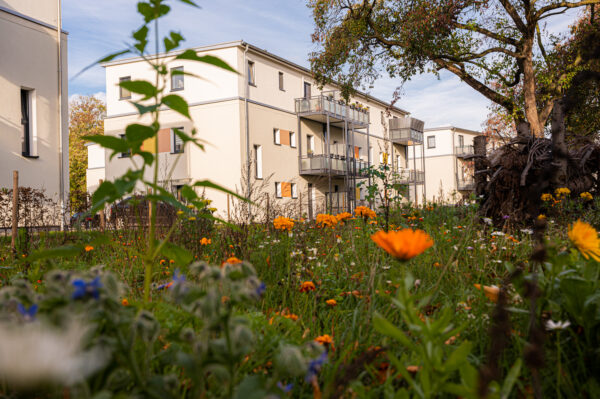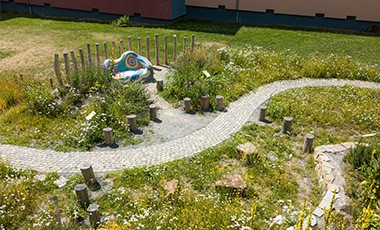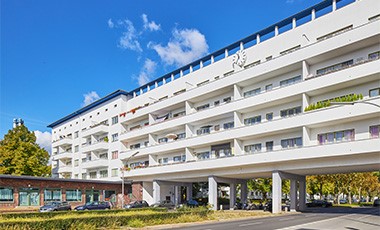Neighborhood Development and Contribution to Infrastructure
GRI
3-3
203-1
Our Approach
As the main arena for action and development and as innovation platforms, the neighborhoods are vitally important to our company. They represent the connection between the needs of their inhabitants and the overarching idea of vibrant cities and communities. It is where we provide people with a home. This includes good neighborly relations, a sense of security and different generations living together in a way that is beneficial to all.
We are convinced that a livable neighborhood strengthens tenant loyalty and increases the value of residential properties. Thinking and acting in terms of neighborhoods is our answer to these relevant and crucial megatrends – it is also the approach we adopt to find solutions for the economic, environmental and social (new) development of our urban housing portfolios, which are largely located in neighborhoods. We want to create infrastructures that suit the specific situations in our neighborhoods. In every neighborhood, this means focusing on the needs of the tenants and combining climate protection, building design and social offers.
Our portfolio in Germany consists of approximately 70 percent apartments grouped in neighborhoods – also referred to as urban quarters. Urban quarters – as per the definition of the Association of German Housing and Real Estate Companies (GdW) – are a visually coherent urban development structure that is seen by its residents as a distinct area and that represents an area for action in which the residential real estate company can make a difference. It comprises at least 150 apartments. In addition to urban quarters, we also have urban clusters that we apply our strategy and the Vonovia business model to in an adjusted format (see The Company).
Structural prerequisites, social environment, needs and location factors: every neighborhood is different. With this in mind, Vonovia creates specific offers and measures for a tailor-made, neighborhood-specific infrastructure. Our neighborhoods are always aligned with clear climate protection requirements (see CO2 Reduction in the Housing Portfolio) and social compatibility criteria (see Living at Fair Prices). We combat climate change with individual and innovative concepts, in particular measures designed to reduce carbon emissions. We design our residential environments and green spaces (see Protecting Biodiversity) to be sustainable from an ecological perspective. Environmental and social aspects go hand in hand here. We create space for local suppliers, medical services and educational institutions, social facilities and services, and creative artists (see Inclusion, Diversity and Social Cohesion). We actively involve our tenants in the intensive coordination processes (see Dialogue with Tenants and Participation). We also cooperate with authorities and other municipal and social institutions and exchange ideas with political representatives (see Contribution to Socio-Political Dialogue). Only if our concepts and ideas are supported by everyone can we implement them successfully and promote value creation.
Organizational Focus
We plan and manage neighborhood development on a decentralized basis via the regions. The regional managers are responsible for the respective projects and implement them along with their area managers. The Chief Rental Officer (CRO) is the Management Board member responsible for the property management business as well as for customer service and portfolio management.
We are increasingly using our own neighborhood developers for on-site implementation. This allows us to address any specific issues as and when they arise.
The investment and participation formats are also the responsibility of, and are managed by, the regions, just like Vonovia’s social commitment. This approach is supplemented by centrally controlled donation and sponsorship measures via corporate communications.
Objectives and Measures
Our goal is to create housing that meets people’s needs and is worth living in. This specifically means that:
- We design affordable homes by means of vertical expansion, densification and new construction.
- We implement modernization in a socially responsible manner.
- We are optimizing the energy requirements of our portfolio and – where necessary – driving forward the CO2-neutral change of energy source.
- We are implementing the expansion of photovoltaics in the neighborhood context.
- We think about and design the residential environment, including recreational areas, playgrounds, and holistic mobility concepts, in an integrated way.
- We include local suppliers, day-care centers, doctors and social and cultural institutions.
- We redesign vacant and/or unused (commercial) spaces, giving them a new lease on life in order to create low-threshold participation opportunities in the neighborhood.
- We promote dialogue with tenants and stakeholders in order to encourage acceptance and influence.
To achieve these aims, we initiate neighborhood development projects together with cities and municipalities and put in place measures to improve infrastructure and realize integrated energy and urban development concepts.
Long-Term Investment Program
Our investment program, which spans several years, comprised 18 neighborhood development projects throughout Germany and around 9,600 residential units in the reporting year. This program will also be extended to Deutsche Wohnen’s portfolio and developed further as part of the integration process. However, due to the deterioration in the investment climate during the reporting year, we were recently forced to push back the start date for new neighborhood developments to reflect general economic conditions. A number of changes to subsidy eligibility conditions – e. g., for new-build energy standard requirements and the sudden discontinuation of certain types of support – made neighborhood development planning, which is long-term and complex, immensely difficult. This is an area that is especially dependent on reliable funding systems. We were therefore unable to use the € 117.8 million that had been earmarked for investment in neighborhood developments in Germany for the 2022 fiscal year in full. We also expect a reduced investment volume for 2023.
Despite the current conditions, we are sticking to our climate pathway and pushing ahead with the planning of further neighborhood developments. We will continue to refine our plans for more neighborhoods in such a way that we can begin to implement them as soon as the investment environment allows. In the meantime, we will also continue to further improve our internal structures and processes.
We employ various tools and enter into partnerships in our neighborhood development projects. In converting and giving a new life to vacant commercial spaces, for instance, we create community spaces that we make available to local initiatives and social institutions rent-free (see Dortmund Westerfilde – Social and Ecological Added Value). In addition, we establish local services, neighborhood meet-ups and day-care centers hand in hand with cooperation partners that focus on the greater good.
We also provide regular funding for the rental and set up of spaces for child day care, social services and assisted living facilities in the local areas. Many are already benefiting from this in Berlin, Munich, Lübeck and many other communities throughout Germany. In Austria, we set up community development programs – where necessary – right after completion of our new construction projects, which will support the new surrounding area until its structures have been fully established.
We also want our tenants to identify with and appreciate their residential environment. In this context, protecting historic buildings and maintaining architectural culture are important topics for us – as can be seen in the historic neighborhoods in the Deutsche Wohnen portfolio that have been named UNESCO World Heritage Sites. When planning and implementing neighborhood development measures, we take the applicable requirements to preserve historic buildings into account and take care to ensure that the neighborhoods retain their original character. Our Swedish subsidiary Victoriahem is also promoting the advantages and potential of its own portfolio properties built in the 60s and 70s – created as part of the “Miljonprogrammet” – in a wide-ranging image campaign (see Redesigning the Milestones of Architectural History).
Implementing Modern Mobility Concepts
Another central aspect of our neighborhood development work is the promotion of modern mobility concepts. The right solutions are not only beneficial for the climate but level up the residential environment in general. Neighborhoods that are well planned in terms of traffic benefit from smaller parking lots, lower traffic volumes and lower emissions. This also reduces costs for our customers, which can also have a positive impact on customer loyalty to the company.
We regularly review the continuation and implementation of existing e-mobility offers, which include the following:
- Reducing car parking spaces and installing bicycle parking spaces and bicycle garages for e-bikes
- Expanding car and bike sharing services (including for e-vehicles)
- Providing connections to public transportation
- Promoting electromobility, e. g., by installing charging infrastructure for cars and e-bikes
- Providing and renting out e-cargo bikes
For instance, we launched a project to make e-cargo bikes available with transport company BOGESTRA (Bochum-Gelsenkirchener Straßenbahnen AG) in the Heßler district of Gelsenkirchen in the reporting year. The expansion of an affordable e-bike offer for tenants is also being reviewed for the coming reporting year.
Training and Partnerships
We have carried out many neighborhood development projects in recent years and have employees across Germany with extensive expertise in this area. This is helpful as neighborhood development is complex and requires teamwork.
To ensure the success of the neighborhood development projects, we offer centralized support services for the local decision makers and operational employees. This includes the internal training and networking format – the Vonovia Neighborhood Academy. Through the Academy, Vonovia trains employees from various areas and with different levels of experience to experts in neighborhood development. In addition to disseminating future-oriented, practical modules and basic knowledge on development and managing the neighborhoods of tomorrow, participants can also gain specific skills. The Vonovia Neighborhood Academy encourages a systematic exchange of experience on neighborhood-related topics (see Training and Personal Development). This is supported by a web-assisted knowledge management system, the Vonovia Guide, which can be used throughout the Group.
In order to spearhead research in the field of neighborhood development and living, Vonovia also sponsors a foundation professorship at the EBZ Business School in Bochum.




